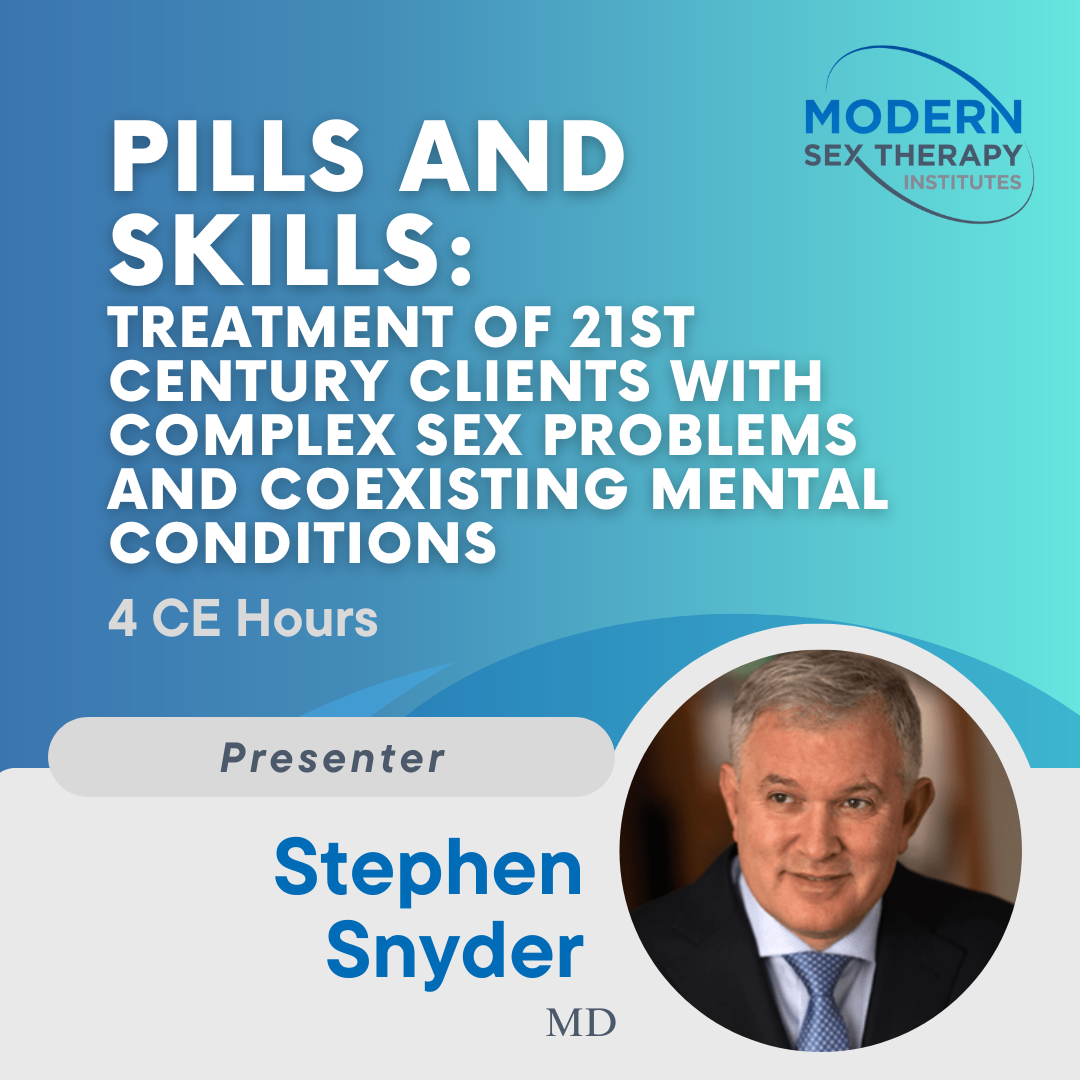FOR QUESTIONS & INTEREST: 561-379-7207
FOR CURRENT STUDENTS: (772)-209-9353
INFO@MODERNSEXTHERAPY.COM
- Certifications & Degrees
- Online Clinical Sexology PhD Program
- 2026 Calendar
- 2025 Calendar
- Sex Therapy Certification
- Transgender Affirmative Mental Health Care Certification
- Couples And Sex Therapy Certification
- LGBTQIA Affirmative Therapy Certification
- Sexual Trauma Certification
- Medical Sexology Certification
- Alternative Relationships Certification
- Sex Counselor Certification
- Certificate In Sexual Health
- Sex Educator Certification
- Problematic Sexual Behavior (PSB) Certification Program
- Somatic Sex Therapist Certification
- Neurodiversity Sexuality Professional Certification
- Sex Informed Therapist Certification
- Sexually Competent Therapist Certification
- Kink Conscious Professional Certification
- Sexual Trauma Informed Therapist Certification
- LGBTQIA+ Informed Professional Certification
- Neurodiverse Sexuality Aware Professional Certification
- Sexual Compulsivity Informed Professional Certification
- Certified Attachment Sex Therapist (CAST) Program
- Workshops & Webinars
- Calendar
- Registration & Fees
- Faculty
- Search
- Find a Professional
- Contact Us
Pills and Skills: Treatment of 21st Century Clients with Complex Sex Problems and Coexisting Mental Conditions
$160.00
4 CE Hours
Speaker: Stephen Snyder, M.D.
Recorded workshop available via video on demand
AASECT Category:
Sex Therapy Education
Section B
Description:
In this course I’ll teach you how some new ways to assess and treat some of the more complex sex problems seen in clinical practice today.
I’ll show you how to get more detailed information about all aspects of clients’ sexual experience: what actually happens in bed, as well as what goes on in each partner’s head. I’ll equip you with a new vocabulary you can use to empower clients to more carefully observe their own arousal (or lack of it!). And I’ll show you how to use all this information to guide treatment, using detailed case examples drawn from my own experience working with over 1,500 individuals and couples.
We’ll discuss how to do sex therapy with clients with the three most common mental conditions seen in sex therapy settings: Mood Disorders, Anxiety Disorders, and Developmental Disorders including ADHD. We’ll discuss the impact of medications on sexual functioning for the one in six Americans who currently take psychiatric medications—including the Serotonin Reuptake Inhibitors (SRI’s), which have a broad range of sexual side effects that every clinician should understand. And we’ll review what every therapist should know about PDE5-Inhibitors such as Viagra and Cialis.
II. Course Objectives:
In this workshop, you’ll learn how to:
- Describe 2 effective treatments for clients with multiple or complex sexual problems.
- Describe the most common mental conditions that co-occur with sexual disorders.
- List 4 of the most common sexual side effects of SRI’s and other psychiatric medications.
- Discuss how to Integrate counseling with medication in the treatment of clients with more complicated sexual problems.
III. Course schedule:
45 min Sexual Status Exam.
- Psychological arousal, as opposed to physiological arousal, is a more reliable indicator of sexual readiness and a better predictor of sexual satisfaction.
- We’ll discuss in detail re how to elicit information re degree of psychological arousal.
- Introduction to the idea of psychological arousal as a “therapeutic regression in the moment.”
- Questioning should include careful inquiry re the usual sequence of events (“Who typically does what to whom first? Then what happens next, and why?”), as well as re participants’ level of subjective psychological arousal at each stage. Case examples will be given.
15 min Q+A and break.
45 min Sexual Review of Systems.
- One sexual problem often leads to others. So by the time clients present for treatment they typically have multiple sexual issues. Sexual “review of systems” provides a framework for making sure multiple issues are all identified.
- Clinical cases will be presented and worked through collaboratively with the attendees, to illustrate how this approach works in the office.
Side-Bar: “What Every Mental Health Care Provider Should Know About PDE-5I inhibitors”
15 min Q+A and break
45 min When Sex Problems Coexist with Mental Conditions
- Many if not most clients presenting with sexual issues in the 21st Century will have coexisting mental conditions. Three conditions in particular occur so commonly, and have such potential impact on sexual functioning, that all sex clinicians should know how to screen for them:
- A. Mood disorders, especially depression.
Screener: PHQ-9 - B. Anxiety disorders, especially social anxiety.
Screener: Liebowitz Social Anxiety Scale - C. Developmental disorders, especially Adult ADHD.
Screener: Adult ADHD Self-Report Scale
Side-Bar: “What Every Mental Health Care Provider Should Know About Sexual Effects of Serotonin Reuptake Inhibitors (SRI’s)”
15 min Q+A and break
45 min Brief Interventions for Clients with Complex Sex Problems
- This section will pull together principles of treatment introduced in previous sections. Particular attention will be paid to integration of psycho-behavioral and pharmacologic approaches for patients with complex sex problems and coexisting mental conditions.
- Simple behavioral techniques will be introduced which have wider applicability in this client population and greater patient acceptance than standard Masters and Johnson “sensate focus.” Clinical examples of their use will be provided.
15 min Q+A and conclude
Speaker bio:
Stephen Snyder, M.D., is an associate clinical professor of psychiatry at the Icahn School of Medicine at Mount Sinai Hospital in New York City, a guest on major media outlets nationwide, and a regular contributor to The Huffington Post. His new book, Love Worth Making: How to Have Ridiculously Great Sex in a Long-Lasting Relationship, (St Martin’s Press 2018) has been hailed by women’s health guru Dr Christiane Northrup as “Hands down, the most practical, fun, and empowering book I’ve ever read on how to have a fabulous sex life in a committed relationship.”
Class originally recorded: 8/13/2018.
Social workers completing this course receive 4 clinical continuing education credits.
MSTI is an approved CE organizational provider for IBOSP, AASECT, and ASWB. Modern Sex Therapy Institutes is part of the Advanced Mental Health Training Institute. The Advanced Mental Health Training Institute has been approved by NBCC as an Approved Continuing Education Provider, ACEP No.6901. Programs that do not qualify for NBCC credit are clearly identified. The Advanced Mental Health Training Institute is solely responsible for all aspects of the programs.
MSTI is approved by the American Psychological Association to sponsor continuing education for Psychologists. The Modern Sex Therapy Institutes maintains responsibility for this program and its content.
Modern Sex Therapy Institutes (MSTI), provider #1787, is approved to offer social work continuing education by the Association of Social Work Boards (ASWB) Approved Continuing Education (ACE) program. Regulatory boards are the final authority on courses accepted for continuing education credit. ACE provider approval period: [1/7/22-1/7/26].
Attendees must attend the entire course and complete a course evaluation to be eligible for CE credit
For Live Courses: To obtain CE credits, attendees must attend the entire course and complete an evaluation to receive credit.
For asynchronous/recorded courses, Attendees must pass the multiple choice posttest with a minimum score of 80% in 3 attempts to be eligible for CE credit.
Certificates of completion can be downloaded immediately upon course completion.

